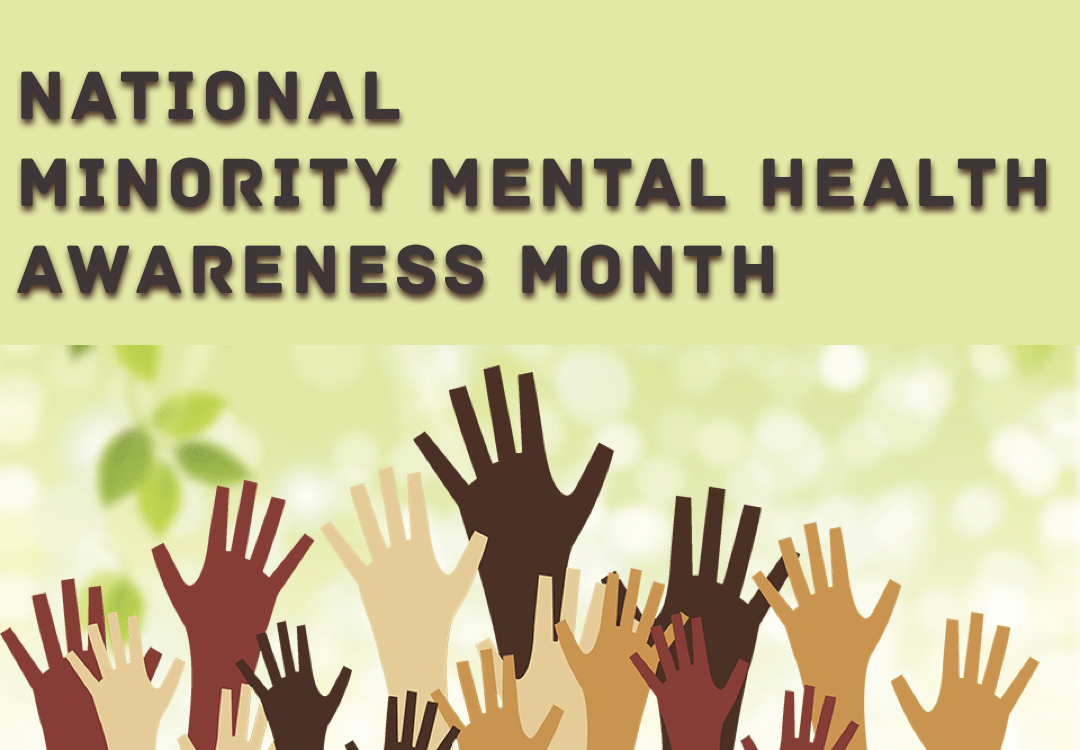July is Minority Mental Health Awareness Month

July was designated as Minority Mental Health Awareness Month to bring awareness to the unique struggles that minority groups face in regard to mental illness. Mental health conditions do not discriminate based on race, color, gender or identity. Anyone can experience the challenges of mental illness regardless of their background.
El Centro’s Behavioral Health Director, Yesenia Rios answers key questions to understand the importance of mental health.
What is mental health?
Mental health is a state of well-being in which every individual realizes his or her own potential, can cope with the normal stresses of life, can work productively and fruitfully, and is able to make a contribution to her or his community.
What does it mean to have a mental illness?
Mental illness refers to a wide range of mental health conditions —disorders that affect your mood, thinking and behavior. Examples of mental illness include depression, anxiety disorders, schizophrenia, eating disorders, and addictive behaviors.
Who does mental illness affect?
Mental disorders affect one in four people. Treatments are available, but nearly two-thirds of people with a known mental disorder never seek help from a health professional.
What causes mental illnesses?
There is no simple answer because no single factor causes mental illness. Mental illnesses are complex diseases, meaning that they are caused by a combination of different factors.
Researchers believe that in most cases of mental illness, both genes and environmental factors play a role. For instance, if a person is at increased risk of having a mental illness because of genetic factors (for example, mental illness runs in the family), he may only develop an illness if a certain combination of stressful situations occurs (environmental factors). Environmental factors can be anything that causes major stress and can occur at any point in life, e.g., death of a loved one, abuse, use of street drugs, or loss of income.
What are some warning signs of mental illness in children and adults?
The warning signs of mental illness in children are severe and frequent temper tantrums, disobedience, aggression, hyperactivity, excessive anxiety, persistent nightmares, poor grades or changes in school performance, and changes to sleeping or eating routines. The warning signs of mental illness in adults are major changes to sleeping and eating patterns. Avoiding activities one used to enjoy and increasing the amount of time spent alone may be early signs of mental illness. In addition to avoiding once enjoyable activities, feeling a sense of shutting down and withdrawing from society (family and friends) and life in general, and increasing the amount of time spent alone. There may also be the feeling that problems and struggles are getting worse and not better, and an overall focus on negative feelings and experiences.
How can I help my child overcome grief?
Experiencing grief firsthand is a different and often confusing process for kids. As a parent, you can’t protect a child from the pain of loss, but you can help him feel safe by building healthy coping skills. And by allowing and encouraging him to express his feelings, you can help him build healthy coping skills that will serve him well in the future. It’s good for kids to express whatever emotions they are feeling. There are many good children’s books about death, and reading these books together can be a great way to start a conversation with your child. Since many children aren’t able to express their emotions through words, other helpful outlets include drawing pictures, building a scrapbook, looking at photo albums, or telling stories. If you notice that your child seems unusually upset and unable to cope with grief and his loss, he may have something called adjustment disorder. Adjustment disorder is a serious and distressing condition that some children develop after experiencing a painful or disruptive event. It is a good idea to consult your child’s doctor if you feel that your child isn’t recovering from a loss in a healthy way.
Does stress cause mental illness?
Many people encounter stress from multiple sources, including work; money, health, and relationship worries; and media overload. Chronic stress also affects a person’s mental health. Many studies show a correlation between stress and the development of mood disorders such as anxiety disorders and depression.
To learn more about El Centro’s behavioral health services, visit https://www.elcentrodecorazon.org/services/behavioral-health-services/
July was designated as Minority Mental Health Awareness Month to bring awareness to the unique struggles that minority groups face regard to mental illness. Mental health conditions do not discriminate based on race, color, gender or identity. Anyone can experience the challenges of mental illness regardless of their background.
El Centro’s Behavioral Health Director, Yesenia Rios answers key questions to understand the importance of mental health.
What is mental health?
Mental health is a state of well-being in which every individual realizes his or her own potential, can cope with the normal stresses of life, can work productively and fruitfully, and is able to make a contribution to her or his community.
What does it mean to have a mental illness?
Mental illness refers to a wide range of mental health conditions —disorders that affect your mood, thinking and behavior. Examples of mental illness include depression, anxiety disorders, schizophrenia, eating disorders, and addictive behaviors.
Who does mental illness affect?
Mental disorders affect one in four people. Treatments are available, but nearly two-thirds of people with a known mental disorder never seek help from a health professional.
What causes mental illnesses?
There is no simple answer because no single factor causes mental illness. Mental illnesses are complex diseases, meaning that they are caused by a combination of different factors.
Researchers believe that in most cases of mental illness, both genes and environmental factors play a role. For instance, if a person is at increased risk of having a mental illness because of genetic factors (for example, mental illness runs in the family), he may only develop an illness if a certain combination of stressful situations occurs (environmental factors). Environmental factors can be anything that causes major stress and can occur at any point in life, e.g., death of a loved one, abuse, use of street drugs, or loss of income.
What are some warning signs of mental illness in children and adults?
The warning signs of mental illness in children are severe and frequent temper tantrums, disobedience, aggression, hyperactivity, excessive anxiety, persistent nightmares, poor grades or changes in school performance, and changes to sleeping or eating routines. The warning signs of mental illness in adults are major changes to sleeping and eating patterns. Avoiding activities one used to enjoy and increasing the amount of time spent alone may be early signs of mental illness. In addition to avoiding once enjoyable activities, feeling a sense of shutting down and withdrawing from society (family and friends) and life in general, and increasing the amount of time spent alone. There may also be the feeling that problems and struggles are getting worse and not better, and an overall focus on negative feelings and experiences.
How can I help my child overcome grief?
Experiencing grief firsthand is a different and often confusing process for kids. As a parent, you can’t protect a child from the pain of loss, but you can help him feel safe by building healthy coping skills. And by allowing and encouraging him to express his feelings, you can help him build healthy coping skills that will serve him well in the future. It’s good for kids to express whatever emotions they are feeling. There are many good children’s books about death, and reading these books together can be a great way to start a conversation with your child. Since many children aren’t able to express their emotions through words, other helpful outlets include drawing pictures, building a scrapbook, looking at photo albums, or telling stories. If you notice that your child seems unusually upset and unable to cope with grief and his loss, he may have something called adjustment disorder. Adjustment disorder is a serious and distressing condition that some children develop after experiencing a painful or disruptive event. It is a good idea to consult your child’s doctor if you feel that your child isn’t recovering from a loss in a healthy way.
Does stress cause mental illness?
Many people encounter stress from multiple sources, including work; money, health, and relationship worries; and media overload. Chronic stress also affects a person’s mental health. Many studies show a correlation between stress and the development of mood disorders such as anxiety disorders and depression.
To learn more about El Centro’s behavioral health services, visit https://www.elcentrodecorazon.org/services/behavioral-health-services/


